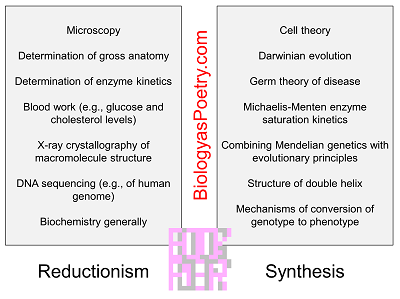∞ generated and posted on 2016.08.21 ∞
Studying individual components of systems rather than systems as a whole.
The nature of science requires some degree of reductionism else the complexity of systems can be overwhelming. Nevertheless, there are different degrees to which the various biology sub-disciplines heed to the reductionism call, with an extreme the study of individual molecules or even specific atomic components of molecules.
Reductionism can be contrast with the synthesis of ideas, which is instead the building up of understanding from an understanding of component parts. While reductionism is crucial to scientific progress, there is always the danger of 'missing the forest for the trees', or simply not being aware of important details which happen to fall just outside of the narrow system under study.

Figure legend: Comparison between reductionist approaches to biology versus syntheses. Note that reductionism tends to be associated with specific techniques whereas syntheses are combinations of ideas. Note also that reductionism doesn't specifically mean that very small things are what is being studied, though the taking of systems apart to their components does tend to reduce things in size, whether they be cells to their molecular components or ecosystems to model microcosms.
Enzyme functioning is a good example of this reductionist approach towards biological understanding, resulting in huge advances in our molecular understanding of life. We know today where individual atoms in enzymes lie and how those atoms interact with other atoms to cause chemicals to change from one form to another (catalysis), thereby allowing living things to not just function properly at cellular levels but, indeed, to function at all.